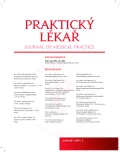-
Medical journals
- Career
Management of hypoglycaemia in everyday clinical practice
Authors: J. Urbanová 1; doc. MUDr. Ludmila Brunerová, Ph.D. 1; J. Brož 2
Authors‘ workplace: Univerzita Karlova v Praze ; 3. lékařská fakulta Centrum pro výzkum diabetu, metabolismu a výživy II. interní klinika 3. LF UK a FNKV Přednosta: prof. MUDr. Michal Kršek, CSc. 1; 2. lékařská fakulta Interní klinika 2. LF UK a FN Motol Přednosta: prof. MUDr. Milan Kvapil, CSc., MBA 2
Published in: Prakt. Lék. 2019; 99(2): 57-59
Category: Reviews
Overview
Hypoglycaemia is a side effect primarily of the insulin, sulfonylurea derivates or glinides therapy. Management of hypoglycaemia is based on the immediate ingestion of carbohydrates – preferably glucose, in the recommended amount of 15–20 g. Several recent studies, however, suggest using amount calculated from the patient’s body weight. The therapy of severe hypoglycaemia in the non-professional settings is still based on glucagon injection; in the professional ones the intravenous administration of glucose is the preferable option. Currently studies with the new forms and options of glucagon administration are finishing.
Keywords:
hypoglycaemia – therapy – glucose – glucagon – type 1 diabetes – type 2 diabetes
Sources
1. Seaquist ER, Anderson J, Childs B, et al. Hypoglycemia and diabetes: a report of a Workgroup of the American Diabetes Association and The Endocrine Society. Diabetes Care 2013; 36(5): 1384–1395.
2. International Hypoglycemia Study Group. Minimizing hypoglycemia in diabetes. Diabetes Care 2015; 38 : 1583–1591.
3. American Diabetes Association. Glycemic targets. Sec. 6. In Standards of medical care in diabetes – 2018. Diabetes Care 2018; 41(Suppl 1): S55–S64.
4. Diabetes Canada Clinical Practice Guidelines Expert Committee. Diabetes Canada 2018 clinical practice guidelines for the prevention and management of diabetes in Canada. Can J Diabetes 2018; 42(Suppl 1): S1–S325.
5. Joint British Diabetes Societies - Inpatient Care Group (JBDS-IP). The hospital management of hypoglycaemia in adults with diabetes mellitus (3rd edition, revised February 2018.
6. Bryden KS, Neil A, Mayou RA, et al. Eating habits, bodyweight, and insulin misuse. A longitudinal study of teenagers and young adults with type 1 diabetes. Diabetes Care 1999; 22(12): 1956–1960.
7. McTravish L, Krebs JD, Weatherall M, et al. Weight-based hypoglycaemia treatment protocol for adults with Type 1 diabetes: a randomized crossover clinical trial. Diabet Med 2015; 32(9): 1143–1148.
8. McTravish L, Corley B, Weatherall M, et al. Weight-based carbohydrate treatment of hypoglycaemia in people with Type 1 diabetes using insulin pump therapy: a randomized crossover clinical trial. Diabet Med 2018; 35(3): 339–346.
9. Krebs JD, Weatherall M, Corley B, et al. Optimizing the management of hypoglycaemia in individuals with type 2 diabetes: A randomized crossover comparison of a weight-based protocol compared with two fixed-dose glucose regimens. Diabetes Obes Metab 2018; 20(5): 1256–1261.
10. Brodows RG, Williams C, Amatruda JM. Treatment of insulin reactions in diabetics. JAMA 1984; 252(24): 3378–3381.
11. Slama G, Traynard PY, Desplanque N, et al. The search for an optimized treatment of hypoglycemia. Arch Intern Med 1990; 150(3): 589–593.
12. Wiethop BV, Cryer PE. Alanine and terbutaline in treatment of hypoglycemia in IDDM. Diabetes Care 1993; 16(8): 1131–1136.
13. Husband AC, Crawford S, McCoy LA, et al. The effectiveness of glucose, sucrose, and fructose in treating hypoglycaemia in children with type 1 diabetes. Pediatr Diabetes 2009; 11(3): 154–158.
14. Hall-Boyer K, Zaloga GP, Chernow B. Glucagon: hormone or therapeutic agent? Crit Care Med 1974; 12(7): 584–589.
15. Lee H, Hosein EA. Chronic alcohol feeding and its withdrawal on the structure and function of the rat liver plasma membrane: a study with 125I-labelled glucagon binding as a metabolic probe. Can J Physiol Pharmacol 1982; 60(9): 1171–1176.
16. American Medical Association, Council on Drugs. AMA drug evaluations annual 1994; 1045.
17. Yale JF, Dulude H, Egeth M, et al. Faster use and fewer failures with needle-free nasal gucagon versus injectable glucagon in severe hypoglycemia rescue: a simulation study. Diabetes Technol Ther 2017; 19(7): 423–432.
Labels
General practitioner for children and adolescents General practitioner for adults
Article was published inGeneral Practitioner

2019 Issue 2-
All articles in this issue
- Hypoglycaemia in type 2 diabetes mellitus – a brief overview for clinical practice
- Management of hypoglycaemia in everyday clinical practice
- Alcohol abuse and oncology
- Vascular and Psychosocial Risk Factors of Mild Cognitive Impairment – pilot study
- Trends in care in nursing homes in the Czech Republic
- Remaining traces of the Hippocratic oath in medical graduation pledges
- Purple urine bag syndrome
- General Practitioner
- Journal archive
- Current issue
- Online only
- About the journal
Most read in this issue- Remaining traces of the Hippocratic oath in medical graduation pledges
- Management of hypoglycaemia in everyday clinical practice
- Trends in care in nursing homes in the Czech Republic
- Alcohol abuse and oncology
Login#ADS_BOTTOM_SCRIPTS#Forgotten passwordEnter the email address that you registered with. We will send you instructions on how to set a new password.
- Career

